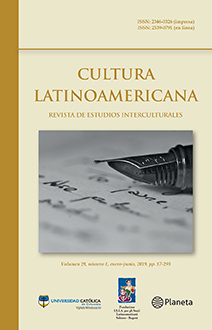Al enviar los artículos para su evaluación, los autores aceptan que transfieren los derechos de publicación a Cultura Latinoamericana. Revista de Estudios Interculturales para su publicación en cualquier medio. Con el fin de aumentar su visibilidad, los documentos se envían a bases de datos y sistemas de indización, así mismo pueden ser consultados en la página web de la Revista
Resumen
El objetivo del presente artículo de investigación es destacar mediante una metodología cualitativa el ejemplo significativo de la relación entre migración y desarrollo económico representado por la migración mexicana. Desde el Programa Bracero, la migración mexicana a Estados Unidos ha aumentado de manera significativa, confluyendo en el Tratado de Libre Comercio de América del Norte (TLC) y en el tratado NAFTA, pero, propiamente el análisis de los mismos demuestra el fracaso de las políticas laborales migratorias, ya que la migración puede ser un factor pujante en el desarrollo económico y no un elemento de disuasión. Por lo tanto, en las políticas de desarrollo se necesita un enfoque integral que considere la migración como un factor de crecimiento.
Palabras clave

Citas
Battistella, G. (2009). Migration and Human Rights. The Uneasy but Essential Relationship in Migration and Human Rights. The United Nations Convention on Migrant Workers Rights (pp. 47-69). In R.Cholewinski, P. De Guchteneire, A. Pecoud (eds.) Unesco. Paris and Cambridge UK.
Boskinm, J. (2014). NAFTA at 20 (The North American Free Trade Agreement’s achievements and challenges). California: Hoover Institution Press, Stanford University.
Cassel, D. (2006). Equal labor rights for undocumented migrant workers (pp. xx-xx). In, A.F. Bayesfsky (ed.) Human rights and refugees, internally displaced persons and migrant workers, essay in memory of Joan Fitzpatrick and Arthur Helton. Boston: Martinus Nijhoff Publishers.
Delgado Wise, R. & Guarnizo, L.E. (2006). Migration and development: lessons from the Mexican experience. Recovered from https:/www.migrationpolicy.org
Di Stasi, A. (1998). Ordine Economico Mondiale e Grandi Spazi Organizzati (pp. xx-xx). In M. Panebianco, A. Lamberti, G. De Simone (eds.) Il G7 ed il nuovo ordine internazionale. Roma-Salerno: LedipElea Press.
Diaz G., & Kuhner, G. (2009). Mexico’s role in promoting and implementing the ICRMW (pp. 219-246). In R. Cholewinski, P. De Guchteneire, A. Pecoud (eds.), Migration and Human Rights: the United Nations Convention on Migrant Workers Rights. Paris, Unesco: Cambridge UK, Cambridge University Press.
Gaines, E., (2003). NAFTA as a symbol on the border. UCLA L. Rev., 51, pp. 1-50.
Gal-or, N. (1998). Labor mobility under NAFTA: regulatory policy spearheading the social supplement to the international trade regime, Arizona Journal of International & Comparative Law, 15 (2), pp. 366.
Gordon, J. (2010). People are not bananas: how immigration differs from trade. Northwestern University Law Review, 104 (3), pp. 1109-1145.
Gordon, J.(2009). Transnational labor citizenship. S. Cal. L. Rev. 80 (3), pp. 503-588.
Gordon, J., (2005). Suburban Sweatshops, the Fight for Immigrant Rights. Massachusetts and London, England: The Belknap Press of Harvard University Press.
Kopinak, K. (1996). Household, gender and migration in Mexican maquiladoras: the case of Nogales. New York: CMS.
Kopinak, K. (1995). The continuing importance of gender as a vehicle for the subordination of women maquiladoras workers in Mexico. Latin American Perspectives: Spring.
La Vega, C. & Lozano-Batista, C. (2006). Advocates should use applicable international standards to address violations of undocumented migrant workers rights in the US. Human Rights and Refugees, 22, pp. 517-550.
Martins, P. (2013). Labour migration and development indicators in the post 2015 global development frame work, Migration and the United Nations post-2015 Development Agenda. Geneva: IOM publications.
Morrone, F. (2013). La violenza contro le donne migranti tra strumenti normativi di cooperazione e prassi internazionale. Diritti umani e Diritto internazionale, 7, pp. 55-77.
Moser, C. (2001). The gendered continuum of violence and conflict (pp. 13-29). In C. Moser, F. Clark (eds.) Victims, Perpetrators or Actors? Gender, Armed Conflict and Political Violence. London: Zed Book.
Reichl Luthra, R. & Waldinger, R. (2010). Into the mainstream? Labor market outcomes of Mexican – origin workers. International Migration Review, 44 (4), pp. 830-868.
Rudolph, H. (1996). The new Gastarbeiter system in Germany. New Community, 22 (2), pp. 287-300.






























